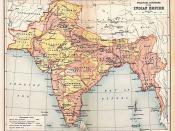Imperialism is the policy of extending a nation's authority by territorial acquisition or by the establishment of economic and political hegemony over other nations. Old Imperialism took place before the onset of the Industrial revolution, during that time period contact and the ability to conquer lands was limited due to the fact of a lack of technology and knowledge. During the years 1870-1914, there was a new Imperialism, in which the Europeans used knowledge and technology from the Industrial Revolution to build their extensive empires. There were many reasons for this new branch of imperialism. Economics was an important factor in the "new Imperialism". Mostly this was brought upon by the Industrial Revolution, which created large surpluses of European capital and a massive demand of raw materials. Nationalism was another powerful factor. Social Darwinism, with the idea of "Survival of the Fittest" and the obligations of the "White Man's Burden" added to the nationalistic spirit in spreading colonialism.
Political prestige in having colonies was also an Imperialistic reason, because the different European nations were competing for the larger empire. In the European countries the Military organizations held great political power. They emphasized the need of controlling strategic areas and establishing vital military bases. For the subjects of this "new Imperialism", especially in India and Africa, there were many benefits and many disadvantages to being part of a European Empire. There were also many pros and cons for the European countries that conquered India and Africa. When the British first came over to Africa and India, they had no intention of conquering them. After a while the British realized how vital Indian and African raw goods were for the factories in Industrialized Europe. Gradually, the British intervened in local ruler's squabbles, and acquired more and more territory as pay for their...


